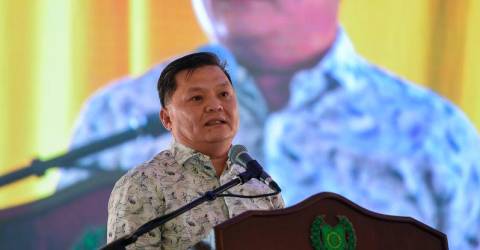ADVERTISE HERE

Dr Lulie (second right) with (from left) Agusten, Dr Wong and Yazid hold the Malaysian and Sarawakian flags with pride at the AGU23.
KUCHING (Dec 16): The Sarawak Tropical Peat Research Institute (Tropi) presented three scientific posters at the American Geophysical Union (AGU) Annual Meeting 2023 in San Francisco, United States.
Its director Datu Dr Lulie Melling led a team of key personnel at the event, which was held from Dec 11-15, including research officers Dr Ken Wong Guan Xhuan, Yazid Imran Muhammad Faizul and Agusten Rabar Ajok.
Dr Wong presented a groundbreaking scientific poster titled ‘Effect of Land Use Change on Methane Emissions in a Tropical Peatland of Sarawak, Malaysia’.
The study, conducted over seven years, measured methane flux before and after the establishment of a plantation on tropical peatland.
“These measurements, made using an eddy covariance tower, provide insights into the environmental consequences of land-use change.
“The findings will contribute significantly to our understanding of greenhouse gas emissions and their long-term impact,” Tropi said in a statement.
Meanwhile, Yazid’s scientific poster titled ‘Evaluation of Machine Learning Methods to Model Net Ecosystem Carbon Dioxide Exchange in a Tropical Peat Swamp Forest.’
This research utilised data-driven machine learning methods to predict carbon emission data in a tropical peat swamp forest over seven years.
“The aim was to develop a robust model capable of predicting greenhouse gas emissions from peatlands at a larger scale, enabling the extension of observations from individual monitoring sites to entire peatland complexes.
“These results are important for national reporting to the United Nations Framework Convention on Climate Change (UNFCCC) to mitigate climate change as part of the Paris Agreement,” it said.
On the other hand, Agusten delved into the critical aspect of peat soil moisture with the poster ‘Long-term Hydrological Dynamics of the Tropical Peatlands of Sarawak, Malaysia.’
Agusten’s study compared data over 12 years in an undrained peat forest and an oil palm plantation on peatland.
“The research assessed these results in relation to the bulk density of the soil and the depth of the water table.
“This comprehensive analysis promises insights into improved peat management practices, particularly in relation to the prevention of peat fires and haze,” it added.
The annual meeting, attended by a diverse range of participants including researchers, scientists, educators, policymakers, journalists and communicators, served as a platform to gain deeper understanding of the planet and its environment and provided participants with opportunity to share their efforts in protecting its future.
Tropi’s active participation in the meeting emphasised the institute’s commitment to advancing research and promoting environmental sustainability.
“This has far-reaching implications for the global community’s understanding of climate change and for achieving our net zero emissions target by 2050,” it said.

 1 year ago
145
1 year ago
145



 English (US) ·
English (US) ·